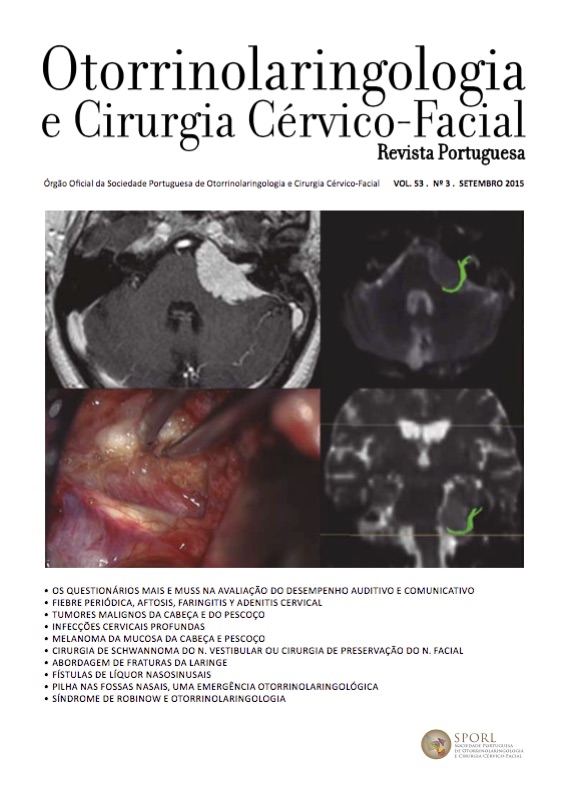Deep neck infections, experience of a portuguese department of otorhinolaryngology
DOI:
https://doi.org/10.34631/sporl.594Keywords:
odontogenic infection, Ludwig’s angina, deep neck infection, cervical drainageAbstract
Neck infections are a real clinical challenge, remaining at present an important health problem.
Purpose: Statistical analysis of our experience with deep neck infections in the Otorhinolaryngology Department at Prof. Doutor Fernando Fonseca Hospital.
Material and methods: Retrospective review of cases who were admitted as having deep neck infections, between 2001- 2011.
Results: In this period 80 patients were admitted with an average age of 44 years. Odontogenic infections accounted for 83,3% of the detected causes. The average hospital stay was 8.72 days. 94% of patients were treated with double-acting antibiotics and 22.5% resorted to cervical drainage.
Conclusion: Even today deep neck infections are a challenging condition, associated with a high mortality rate. Odontogenic infection is the main etiology. Early intravenous antibiotics and surgical drainage are essential in the treatment of deep neck infections.
Downloads
References
Oliver E; Gillespie M. Deep neck Space Infections In: Flint P (Eds.) Cummings Otolaryngology, Head and Neck Surgery, Philadelphia, Mosby-Elsevier 2010: pp201-209
Tavares S, Tavares G, Cavalcanti M, Paiva M. et al. Angina de Ludwig: revisão de literatura e relato de caso; Rev. Cir. Traumatol. Buco-Maxilo-fac., Brasil, 2009; 9(3):9-14
Gorjón P, Pérez P, Martin A, Dios J. et al. Deep Neck Infection: Review of 286 Cases. Acta Otorrinolaringol Esp. 2012;63(1):31-41
Lee Q, Kanagalingam J. Bacteriology of deep neck abscesses: a retrospective review of 96 consecutive cases. Singapore Med J 2011;52(5):351-5
Hasan W, Leonard D, Russell J. Ludwig’s Angina - A Controversial Surgical Emergency: How We Do It. Int J Otolaryngol, Volume 2011, Article ID 231816
Shanti R, Aziz S. Should we wait for development of an abscess before we perform incision and drainage? Oral Maxillofac Surg Clin North Am. 2011 Nov;23(4):513-8
Huang T, Liu T, Chen P, Tseng F, et al. Deep Neck Infection: Analysis of 185 cases, Wiley InterScience (online Ed Engl). 2004 doi:10.1002/hed.2004,www.sbccp.org.br/arquivos/HN_10_2004_deep_neck_
infection.pdf accessed March 2012
Christian J. Odontogenic Infections. In: Flint P (Eds.) Cummings Otolaryngology, Head and Neck Surgery, Philadelphia, Mosby-Elsevier 2010: pp177-190
Yang S, Lee M, See L, Huang S, Chen T et al. Deep neck abscess: an analysis of microbial etiology and the effectiveness of antibiotics. Infection and Drug Resistance, Taiwan, 2008:1 1-8






